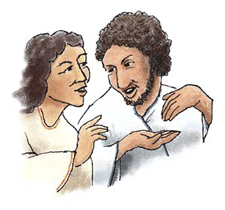Both Mary and Martha
All the Sunday Gospel readings this summer are from Luke’s narrative about the journey of Jesus and his disciples up to Jerusalem. As they move from place to place, they rely on the generosity of persons along the way. Today’s Old Testament reading from Genesis 18 about Abraham’s hospitality to his mysterious visitors and its surprising results provides a glimpse of the importance of hospitality in the ancient Near East. The episode narrated in Luke 10 takes place at the house of Mary and Martha. While enjoying their hospitality, Jesus takes the opportunity to continue his teaching ministry. Mary joins in the session, while her sister Martha attends to the needs of their guests.
“She had a sister named Mary who sat beside the Lord at his feet listening to him speak” (Luke 10:39)
• Do you identify more with Martha or with Mary?
• What challenges does Jesus’ inclusion of Mary in his teaching session pose for our church and society?
• What forms does contemplation take in your life? Do you give yourself regular time to read, think and pray?
The inclusion of women in such a session would have been unusual in first-century Palestinian Jewish society. This kind of religious discourse was generally limited to men in Jesus’ time. In patriarchal societies, there was (and is) a strict division of labor along gender lines. There is “women’s work” and “men’s work.” In today’s text Martha dutifully performs “women’s work” by serving her guests and seeing to the practical aspects of hospitality. Meanwhile, Martha becomes annoyed that Mary fails to help her, because she is with the men listening to Jesus. Instead of directing Mary to help Martha, Jesus admonishes Martha for being overly concerned with household matters and suggests that Mary has chosen “the better part.” Jesus’ willingness to include women in his teaching activity provides an important challenge to our church and society today.
The Martha-and-Mary narrative also challenges us to balance practical action and contemplation. In the history of biblical interpretation, it has been customary to identify Martha with the active form of religious life and Mary with the contemplative form of religious life. But rather than limiting them to religious life and contrasting them as “either…or,” it might be better to view them as “both…and.” We all (religious and lay) need both contemplation and activity.
One of the ironies of modern life is that the very devices that save us time and energy (computers, household appliances, etc.) often impose new burdens upon us. We can become slaves to our machines. We can spend all our lives acting like Martha, so overwhelmed with practical duties that we end up intellectually and spiritually empty. Now, perhaps more than ever, we also need to give ourselves time and space in which to think and pray. This is the “better part” that Mary chose. Giving time to contemplation does not mean neglecting the practical dimensions of our lives. Rather, it means giving ourselves the opportunity to place what we do in the larger context of our lives and our relationships with God and others. We need to be both Mary and Martha. In the midst of the many duties and responsibilities that modern life imposes on us, we need to make time and space to sit beside Mary at the feet of Jesus and renew ourselves intellectually and spiritually.
This article also appeared in print, under the headline “Both Mary and Martha,” in the July 16, 2007, issue.








